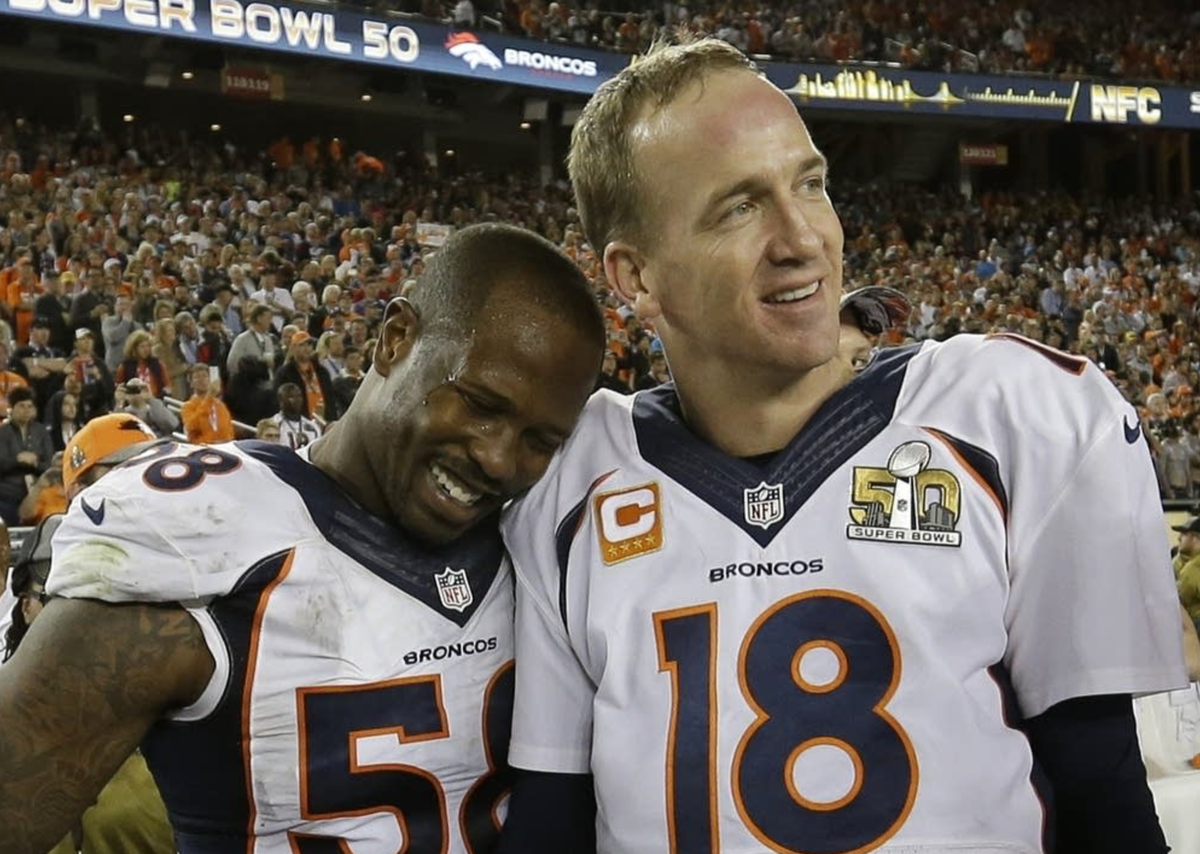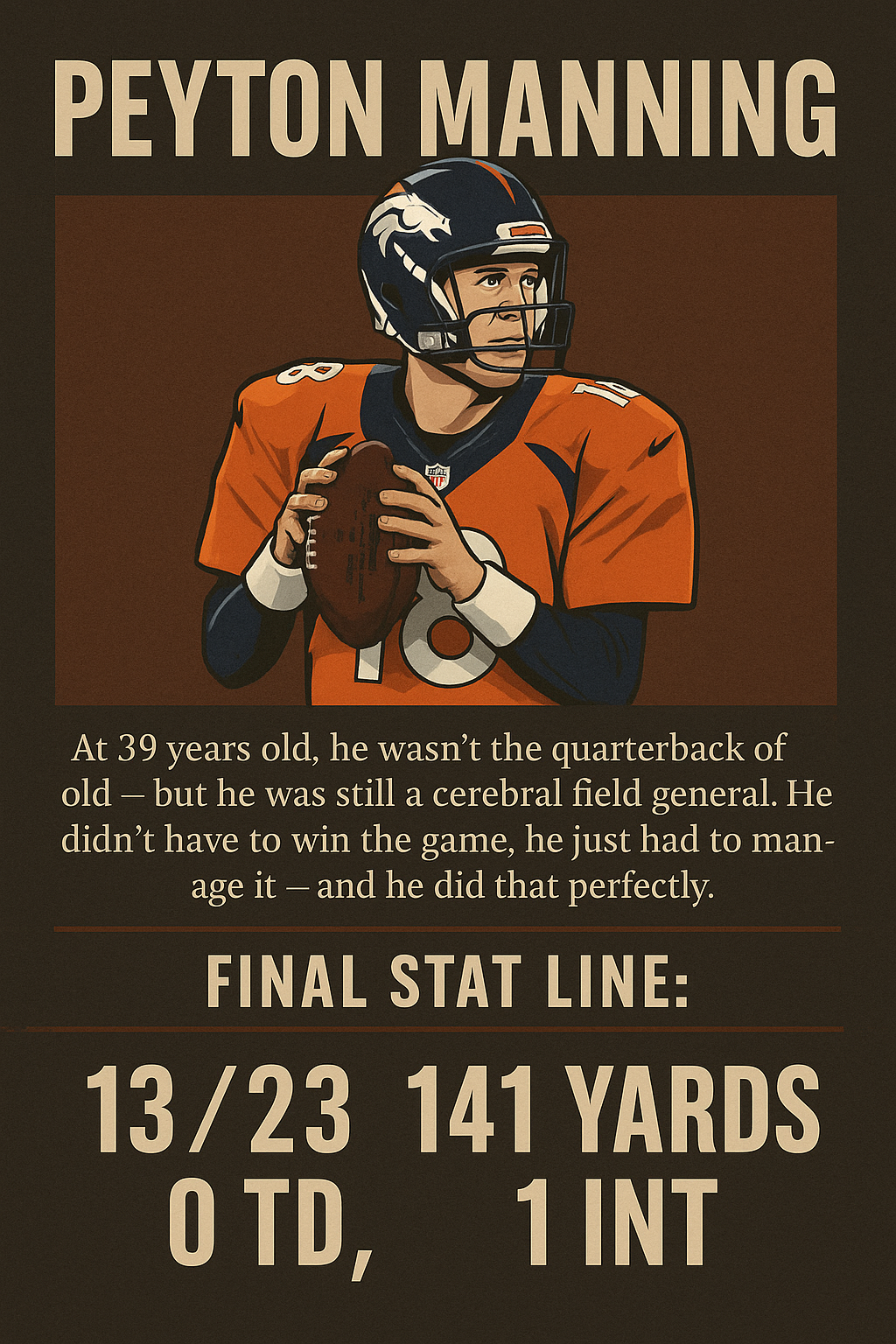Super Bowl L: The Final Bow of a Legend and the Rise of a Historic Defense

In the pantheon of football’s most symbolic moments, few stand taller than Super Bowl 50. Held on February 7, 2016, at Levi’s Stadium in Santa Clara, California, the milestone event was as much about nostalgia and history as it was about ferocity and strategy. It brought together two of the NFL’s most compelling narratives: the farewell of one of football’s greatest quarterbacks, Peyton Manning, and the coronation of one of the most dominant defenses the league had seen in decades—the Denver Broncos.
This was a game where offense took a back seat. The Carolina Panthers, led by 2015 MVP Cam Newton, came in as heavy favorites with a 17-1 record and the NFL’s top-scoring offense. But Denver, under defensive coordinator Wade Phillips, had other plans.
The Game
Final Score:
Denver Broncos 24, Carolina Panthers 10
From the opening kickoff, it became clear that Denver’s game plan wasn’t built around Peyton Manning’s arm, but rather on unleashing the relentless front seven that had dismantled Tom Brady in the AFC Championship Game just two weeks earlier.
Carolina’s offensive line had been serviceable throughout the season, but the Broncos made them look like traffic cones. Von Miller, who would go on to win Super Bowl MVP, was a nightmare from the edge. He recorded 2.5 sacks, six total tackles, two forced fumbles, and a constant presence in the Panthers' backfield.
“It was like watching the '85 Bears on a dry California afternoon,” said Sam Trennard of the Super Bowl Historical Society. “What made it even more surreal was that everyone came in expecting a quarterback duel—and what we got was a defensive dissertation.”
Denver scored first with a Brandon McManus field goal, but the game’s turning point came early in the first quarter. On a 3rd-and-10 from Carolina's own 15-yard line, Von Miller strip-sacked Cam Newton and defensive end Malik Jackson recovered the ball in the end zone for a touchdown. The Broncos led 10-0 and never relinquished the lead.
Carolina struggled to find rhythm all game. Newton completed just 18 of 41 passes for 265 yards, no touchdowns, and one interception. The Panthers also committed four turnovers, which proved costly. Denver didn’t play perfect football—Peyton threw an interception and fumbled once—but the defense was so dominant it didn’t matter.
By the fourth quarter, the sense of inevitability had settled in. Miller forced another fumble deep in Carolina territory with just over four minutes remaining. C.J. Anderson punched in a two-yard touchdown and Denver extended the lead to 24–10, sealing the game.
The MVP and Defensive Clinic
Von Miller was a one-man wrecking crew. His explosive first step, relentless motor, and football IQ turned a star-studded Carolina offense into a puddle of frustration. His performance was reminiscent of other legendary defensive MVPs like Ray Lewis (Super Bowl XXXV) and Richard Dent (Super Bowl XX).
“He wasn’t just disruptive,” explained Julius Mendel, senior curator for the Super Bowl Historical Society. “He was surgical. Von Miller’s Super Bowl 50 performance will be taught in film rooms for generations.”
Denver’s defense held Carolina to just 10 points—their lowest output all season—and sacked Newton seven times. Their coverage was equally suffocating, with Chris Harris Jr., Aqib Talib, and Bradley Roby keeping Carolina’s receivers off-balance and out of sync.
The End of an Era
The emotional weight of the game centered around Peyton Manning. At 39 years old, he wasn’t the quarterback of old—he had thrown nine touchdowns to 17 interceptions during the regular season—but he was still a cerebral field general. He didn’t have to win the game, he just had to manage it—and he did that perfectly.
Manning’s final stat line: 13-of-23 for 141 yards, no touchdowns, and one interception. It wasn’t spectacular, but it was efficient when it mattered. He avoided unnecessary risks, checked into the right calls, and trusted the defense.

After the game, Manning confirmed what many suspected: this would be his final game.
“I’ll take some time to reflect,” he said on the podium. “I want to savor the moment, kiss my wife and kids, and maybe even drink a couple Budweisers.”
For a quarterback with five MVPs, two Super Bowl titles, and countless records, it was a poetic ending—not the hero charging into the end zone, but the wise general riding off into the sunset.
Carolina’s Collapse
The Panthers came into the game with swagger and youth, but were humbled under the Super Bowl lights. Their dominant run through the regular season and playoffs—blowing out Seattle and Arizona—gave way to a frustrating, mistake-riddled performance on the biggest stage.
Newton, so charismatic and dominant all year, was visibly shaken. His postgame press conference was curt and controversial. Some criticized his demeanor, but it was the raw emotion of a competitor who had just endured the worst defeat of his life.
Despite the loss, Newton would go on to play several more seasons at a high level, but the magic of 2015 was never recaptured.
A Defensive Blueprint
Super Bowl 50 redefined how teams think about championship rosters. In an era dominated by high-powered offenses and MVP quarterbacks, the Broncos showed that a world-class defense could still dictate the outcome.
General Manager John Elway, himself a two-time Super Bowl-winning quarterback, built the roster with a “win-now” mentality—investing heavily in the defense through free agency and the draft.
Players like DeMarcus Ware, Derek Wolfe, Sylvester Williams, and Danny Trevathan complemented Miller’s havoc-wreaking ability, creating a unit that pressured quarterbacks on nearly 50% of dropbacks during the postseason.
“We weren’t built to win shootouts,” Elway said later. “We were built to dominate.”
The Legacy
Super Bowl 50 will forever be remembered as the swan song of Peyton Manning and the apotheosis of Von Miller. It was a game that bucked the modern narrative of offensive firepower and reminded fans of the age-old adage: defense wins championships.
For Denver, it was their third Super Bowl title and a redemption story after humiliating defeats in Super Bowls XLVIII and XXI. For Carolina, it was a heartbreaking reminder that greatness in the regular season doesn’t always translate into postseason glory.
From the golden “50” logo at midfield to the dazzling halftime performance by Coldplay, Beyoncé, and Bruno Mars, everything about Super Bowl 50 felt grand—and fitting for such a historic chapter in NFL lore.
In Summary:
- Final Score: Denver 24, Carolina 10
- MVP: Von Miller (2.5 sacks, 2 forced fumbles)
- Peyton Manning: Last game of career
- Cam Newton: Sacked 7 times, 1 INT, 1 fumble
- Turnovers: Carolina 4, Denver 2
- Halftime Show: Coldplay, Beyoncé, Bruno Mars
As the Super Bowl Historical Society notes in its retrospective archive:
“If Super Bowl 50 taught us anything, it’s that a legendary quarterback’s curtain call can share the spotlight with a defense so dominant, it demands its own legacy.”
And in the words of Sam Trennard, once more:
“In a game filled with stars, it was the storm of orange jerseys on defense that turned the night golden.”
